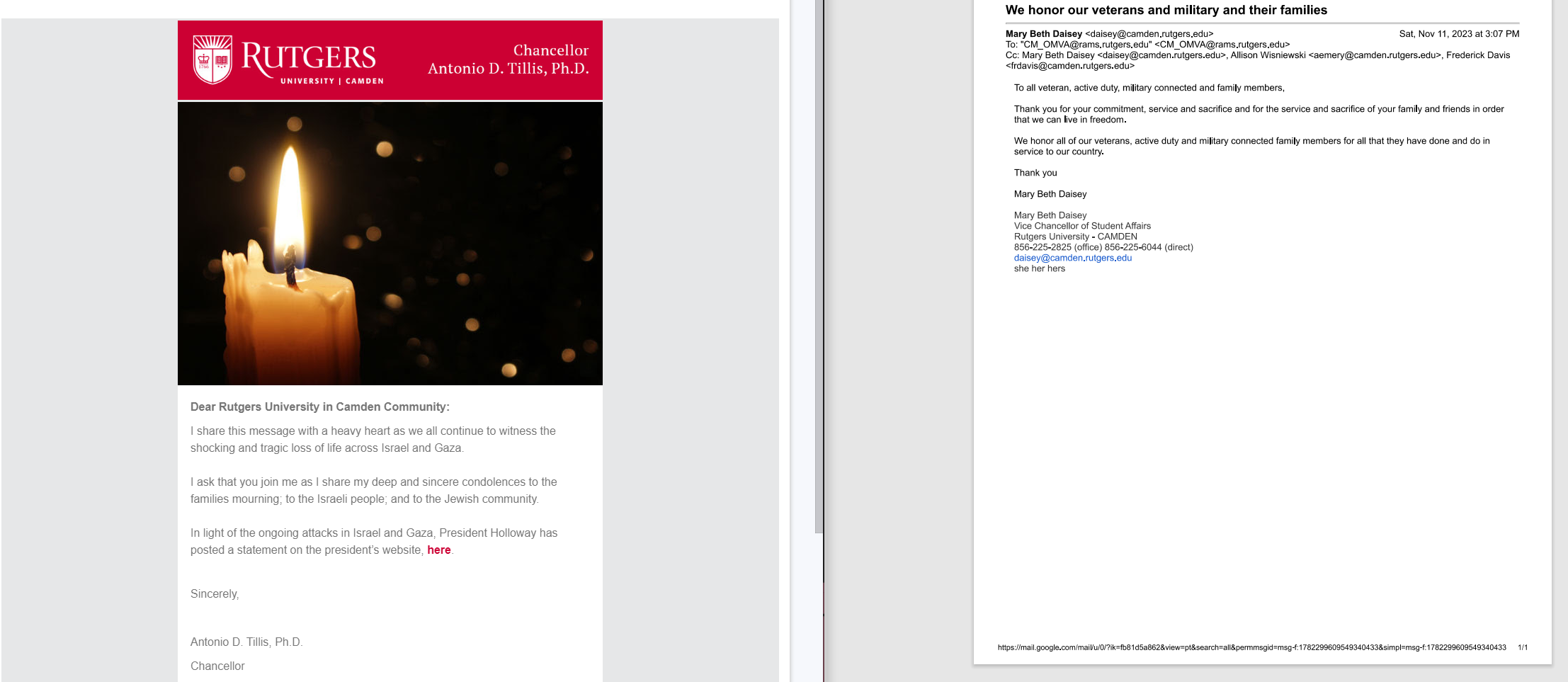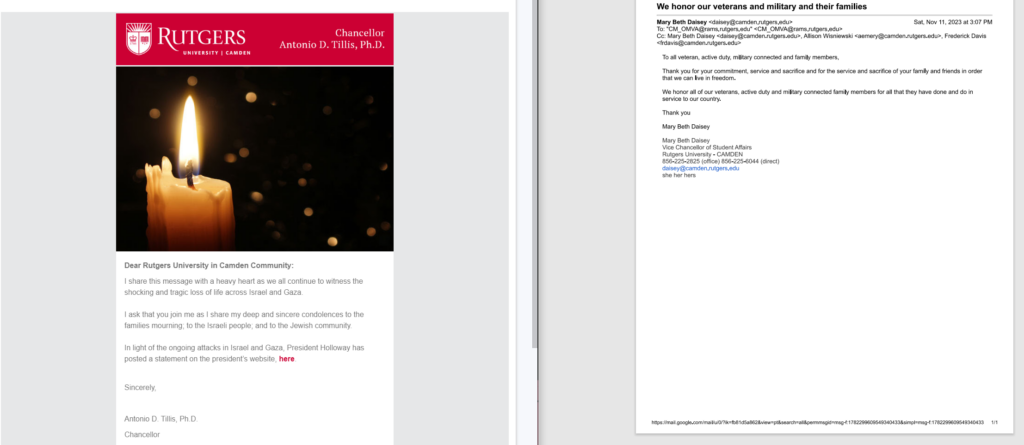
G.I. Blues
Veterans’ Affairs Office Sounds the Alarm on a “growing cancer” of Anti-Veteran Sentiment

By Julio Dagand
In the numbers game of demographics, it is an inevitability that over time some groups may find themselves overlooked or underserved. Jake Kopach and the Office of Military and Veterans’ Affairs believe veterans have become an overlooked minority at Rutgers Camden, neglected by university leadership amidst the politics of campus life.
Each year, on November 11th, the United States celebrates Veterans’ Day. This past November, Rutgers Camden held a luncheon to mark the occasion. Lunch was served, pictures were taken, and awards were changing hands. Mr. Jake Kopach, a former United States Marine with combat service, was to receive an award for his work with the OMVA. Instead of delivering another acceptance speech like the others given that afternoon, he chose to level grievances at the university for what he felt was a divide between the university and the veterans of RUC, hoping that the surprising words would inspire action. Among his grievances were that in the past 2 years, Chancellor Tillis hadn’t attended a single OMVA-held event and that the university hadn’t acknowledged any of the many holidays related to veterans in any capacity for over a calendar year including the nation’s Independence Day or Military Appreciation Month. Kopach would go on to say, “You would think a university named after a veteran from the war for our nation’s independence… you’d think we would do more to honor that. Independence Day wasn’t even celebrated here last year, let alone Memorial Day.”
However, the change that Kopach sought did not come. His speech at the Veterans’ Day luncheon had turned up only a short meeting with the Chancellor’s Chief of Staff Robert McKee and nothing appeared to be changing.
On February 20th, an email was sent by Mr. Kopach to members of the RUC veterans community and what it contained was surprising. The correspondence, titled simply “Requesting Support,” laid out over 1400 words what Jake Kopach and his comrades could describe as nothing less than a “growing cancer” of indifference or even outright prejudices from students and campus leadership alike. He wrote of how the task of replacing the torn and tattered American flags on campus was turned into a nearly 2-month ordeal, how the on-campus memorial plaque to a fallen United States Marine and Rutgers Student was being used as a seat by uncaring students, how the OMVA’s events including visits from nearly 100+ year old veterans were sparsely attended and not advertised by the university at all, and how everyone from the aforementioned elderly veterans to his own pregnant wife to recipients of the nation’s Purple Heart – an award given to service members wounded in the line of fire – were denied on-campus parking accommodations even as guests. Having “exhausted all diplomatic channels,” Jake Kopach felt he had little recourse but to start bringing attention to the issues by any means necessary. In perhaps one of the letter’s most damning turns of phrase, he writes “I learned quickly that the only thing the university leadership cares about in regards to the Veterans that attend Rutgers is the federal money that comes with them.”
When questioned about what he saw as the symptoms of the “growing cancer” of anti veteran sentiment he saw on campus, Kopach said that what he saw was a culture shift that went beyond the territory of the campus but was being woven across the country. attributing part of it to a fatigue brought on by 20 years of war. While he acknowledged the wide array of beliefs across all generations that made it fruitless to try and pin down one age group in particular, Kopach also acknowledged that as time marches on veterans are becoming rarer and older. “Most Americans that were born here don’t see the rights that they’re enshrined with. That’s a multigenerational issue.”
Kopach also stressed that support for our nation’s troops did not necessarily have to take a partisan approach: “At the end of the day, when we enlist we do it to support and defend the constitution. There can be interpretations one way or another, but … this document exists, and millions of Americans have lost their lives in support of what it enshrines. That’s what’s important.”
One of Mr. Kopach’s examples of the bias against veterans was in his own inbox. He demonstrated that while Veterans’ Day last year went completely unacknowledged by the campus except for a personal dispatch from the Vice Chancellor to the OMVA whereas the events in Gaza on October 7th were acknowledged almost instantly in an email with custom imagery addressed to every single student, addressed from the University president. “I finally had enough when the entire month of May being Military Appreciation Month and more importantly Memorial Day were ignored by the university. They pushed nothing out in support of their Veteran population. They did however; push out support for the war in Israel. Other country’s service members matter more to Chancellor Tillis than American service members… It’s not trendy and it doesn’t align with his political values to recognize veterans,” Kopach said on the issue.
A meeting was held with Chancellor Tillis over spring break (the then-upcoming meeting was mentioned in the email as a “slap to the face” that indicated to the OMVA team they weren’t worth meeting with during normal business hours), where the OMVA was able to present a list of 13 goals that they felt would go a long way in turning around the perceived air of indifference and bias. Among them were some shocking facts; namely that the campus currently only employs one full-time employee in the Office of Veterans Affairs in contrast with New Brunswick’s seven full time veteran advocates plus certifying officials. Also addressed was the current lack of a deployment policy, forcing students in the National Guard and other reserve services to abandon their education and reapply if they get deployed for a year or more.
The decision to send out this wide-reaching correspondence with such charged language was not taken lightly. While Kopach confirmed that his office did everything within their power to make sure the email was appropriate and not sent in a way that abused any university resources, there was still an underlying fear that it wouldn’t go far enough to engender any real support.
Jake Kopach’s biggest hope? That the Office of Military and Veterans’ Affairs can manage to stay open. “My hope overall is that this office survives… this office was created from veterans requesting it, and before it we had just what a lot of other universities have: just a certifying official. Without engagement, without the community coming together to be more involved with what we’re pushing, it’s gonna disappear, the university is going to see us as an expenditure they don’t need to have. The next war is coming, those vets are gonna get out, they’re going to want to go to school, they won’t have this support, and the cycle continues where they’ll have to fight to be recognized. Whereas if we, here, fight to defend our place and prove we’re worthy of being here and enshrine it… we can make sure this support continues.”
Kopach shared the emails above. The one on the left is a direct email to all students from the University President addressing the October 7th attacks on Israel and the one on the right a personal correspondence from the Vice Chancellor, the only word from the university on Veterans’ Day.

